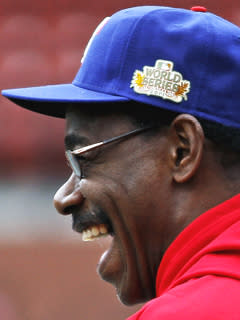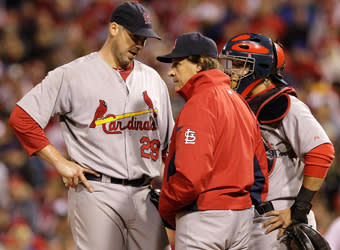Series managers are each marvels in their own way
ST. LOUIS – On the benches, the players stare.
The Texas Rangers look at Ron Washington, force of nature, his feet pitter-pattering and his arms windmilling and his mouth spitting out words faster than the Micro Machines man, strutting and dancing and moving and grooving, all led by that phantasmagorical being he calls "The Spirit." It is wonderful theater, this 59-year-old man leading the American League champions through sheer attitude.
The St. Louis Cardinals look at Tony La Russa. They see nothing. No emotion, good or bad. No engagement, right or wrong. They know that his brain is moving like Washington's body, playing through scenarios, matchups, probabilities, statistics, opportunities, doing the intellectual dance that after 33 years still hasn't gotten old. It transfixes them, the fashion in which he helms the National League champions with haughty precision.
These are not just stereotypical portrayals of the two managers of this 107th World Series, two men whose maneuvering and handling of their respective rosters led them to Busch Stadium for Game 1 at 8:05 p.m. ET on Wednesday. It is who they are and how they won. Washington loves the strategy, craves managing games in an NL park, and his second consecutive World Series is a testament not just to the Rangers' roster but Washington's ability to employ it correctly. At the same time, he knows that when it comes to tactics and countermeasures he's not going to win such battles of wits with La Russa.
"I don't think I can ever live up to matching a wit with Tony La Russa," Washington said.
La Russa, too, knows that never can he engage his team in the fashion Washington does the Rangers. La Russa creates a striking attitude with his team annually, forging a bond around some common enemy or hurdle or adverse condition. The clubhouse's looseness, however, is far more on account of the players than the manager who spends so much time behind the door of his office.
[Related: Cards' closer Motte can't see where he's throwing]
What goes on behind there is a mystery. Same for what is said on the Rangers' bench. And considering this is a World Series about the managers, about two diametrically opposed leaders fighting for one title, there's no better way to learn who they are than through the people who spend the most time around them.
What America knows of Ron Washington they know because of Pete Macheska. He is the lead producer for Fox's baseball telecasts and the man who, along with director Bill Webb, helped introduce the greatest bit of sports broadcasting ingenuity since the score box: the Wash Cam.
"Bill goes to him a lot," Macheska said. "He gives great pictures."
And as anyone who watched the AL Division Series or AL Championship Series can attest, it's true. Washington never stops moving. Never. He flits up and down the bench when there aren't runners on base. He parks himself on the dugout steps when there are. And then his histrionics begin.
"Watching him when someone's scoring is awesome," catcher Mike Napoli(notes) said. "His feet are going. It's like he's running with you when you're on the bases."
"I like it better when he rolls his hand around" like a helicopter, shortstop Elvis Andrus(notes) said. "That's funny."
"I just like watching him when we're hitting," starter Derek Holland(notes) said. "He reacts. I don't know. It's like he has a spasm or something."
With every swing and miss, Washington will recoil – particularly when it's Josh Hamilton(notes) or Nelson Cruz(notes), like he was expecting a home run. Considering how often the Rangers get on base, Washington's whiplash quotient is dangerously high.
[Related: Slideshow: Cardinals, Rangers prepare for World Series]
Fox loves it. Washington plays games with sunflower seeds. His pats on the butt are hard enough to leave handprints. During Game 6 of the ALCS, when the Rangers started piling on runs in their 15-5 victory, Washington started strutting through the dugout, a replayable event Fox milked in slo-mo glory.
"The camera just needs to be on him," Rangers star Josh Hamilton said. "You need to have a Wash cam all the time. Of course, no audio."
There is a reason Fox does not use sound with its camera in the Texas Rangers' dugout. If a sailor has a dirty mouth, Washington is Master Chief Petty Officer.
"He says some good stuff," Holland said. "I really can't share."
"No," Andrus said. "That's got to stay in the dugout."
Fine. Just know Washington makes Ichiro's All-Star game speech look tame. "You don't want a manager," Hamilton said, "who's sitting there like this all the time."
Hamilton froze. His face curled into a dour pose. He was a lot like – well, a lot like the manager the Rangers are facing.
"Let's put it this way," Macheska said. "You are going to see shots of Tony La Russa. But I don't think we're going to be showing any replays of him."
Sometime next year, Tony La Russa is going to win his 2,764th game and pass John McGraw for second on the all-time victory list. This is staggering. Managers get about two years, give or take one, to prove they belong. Most don't. Those who do eventually get jettisoned after a decade or so anyway, off to the glue factory to make room for the new ones. La Russa has been going three decades strong now, with a pair of World Series rings already, and not only is he still a capable manager, he seems to be getting better.
La Russa's attention to detail mystifies his players. They marvel at how he stares at a lineup card, dissects information, applies it on the fly and seems to come out of every battle on the better end.
"Tony's mind is a think tank," Cardinals second baseman Nick Punto(notes) said. "It's always going. He spends hours in that office. That makes us feel prepared when we know our leader is prepared.
"He has no fear."
What often comes off as managerial narcissism – La Russa is widely derided in clubhouses around the games for his meddlesome tendencies – has been pure magic this postseason. "He's not randomly doing things," Cardinals outfielder Matt Holliday(notes) said, and he's right: going with 28 2/3 innings of relief pitching in the NL Championship Series wasn't La Russa's plan. It just happened – and for the best.
"You know he doesn't really care about your feelings," Cardinals starter Kyle Lohse(notes) said, "and that's the way it should be."
Lohse got yanked from his NLCS start after 4 1/3 innings. Same with Jaime Garcia(notes), who had allowed only one run.
"It's a little difficult, because if you don't go six innings, you feel like you've let your team down," Garcia said. "If you go under that, you're mad at yourself, but when you get to this point, the job our bullpen has been doing, you have to trust him."
Doing so takes time. For some, it never happens. La Russa has feuded with Hall of Famer Ozzie Smith, third baseman Scott Rolen(notes) and outfielder Colby Rasmus(notes), whose trade in July allowed the Cardinals to stretch their bullpen out and play to La Russa's strengths as a tinkerer. He stands near the same step as Washington, only with lineup card in tow and pitching coach Dave Duncan always beside him. They consult on everything, from changing pitchers to approaching hitters and beyond.
By now, the Cardinals players know better.
"I try," Lohse said, "to stay as far away as possible."
They do exist outside of their own little worlds, these managers.
La Russa showed emotion upon the final out of the NLCS.
"I think that was probably the first time he smiled all series," Lohse said.
Washington commiserates with pitching coach Mike Maddux and bench coach Jackie Moore on everything from relief options – which he handled deftly in the first two rounds, especially unleashing Alexi Ogando(notes) as a multiple-inning slayer in relief – to when to send runners. Washington may manage by gut, but when Moore told him to pitch out in the AL Division Series against Tampa, he did – and nailed a runner.
[Related: Rangers have the edge heading into World Series]
"Wash has a plan," Rangers reliever Darren Oliver(notes) said. "You just don't see it because he looks like he wants to go out there and play."
Last season, about two months before the Rangers' World Series run, Washington played in an old-timers' game in Minnesota, where he spent most of his career. He had taken batting practice in the weeks leading up to it and stuck himself in center field, not exactly the position for a soon-to-be 60-year-old. He strained his hamstring. And you'd think Ron Washington would learn to slow down. Oh, no. This is him. It always will be.
Just as Tony La Russa never will cease to be the instigator of unnecessary beefs, the manager who more than any makes the game about himself, the genius who doesn't necessarily shy away from that title. He earned it, of course, and keeps doing so. Punto once tried to spend a game understanding La Russa's maneuvers.
"It just gives me a headache," he said. "He's a step or two ahead of me every time."
It's Washington's job to stay in lockstep with La Russa more than La Russa has to with Washington. If starting pitching continues to disintegrate early as it has all postseason, the moves are going to be more important than ever.
In a battle of wit, Washington wins with the greatest one-liners baseball has seen since Yogi Berra. In a battle of wits, however, the advantage trends toward La Russa, the man with two World Series rings to Washington's zero.
This is their stage. Fox's cameras will train their lenses on both. And no matter Washington's antics, they'll spend more time on the manager who does the most important thing: win.
Other popular stories on Yahoo! Sports:
• Disgruntled QB Carson Palmer traded to Raiders for two high picks
• English league worried about American ownership
• College football power rankings: Week 8


